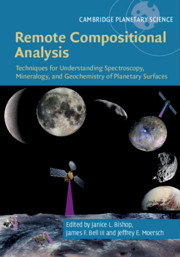 Remote Compositional Analysis
Remote Compositional Analysis Book contents
- Remote Compositional Analysis
- Cambridge Planetary Science
- Remote Compositional Analysis
- Copyright page
- Contents
- Contributors
- Foreword
- Preface
- Acknowledgments
- Part I Theory of Remote Compositional Analysis Techniques and Laboratory Measurements
- 1 Electronic Spectra of Minerals in the Visible and Near-Infrared Regions
- 2 Theory of Reflectance and Emittance Spectroscopy of Geologic Materials in the Visible and Infrared Regions
- 3 Mid-infrared (Thermal) Emission and Reflectance Spectroscopy
- 4 Visible and Near-Infrared Reflectance Spectroscopy
- 5 Spectroscopy of Ices, Volatiles, and Organics in the Visible and Infrared Regions
- 6 Raman Spectroscopy
- 7 Mössbauer Spectroscopy
- 8 Laser-Induced Breakdown Spectroscopy
- 9 Neutron, Gamma-Ray, and X-Ray Spectroscopy
- 10 Radar Remote Sensing
- Part II Terrestrial Field and Airborne Applications
- Part III Analysis Methods
- Part IV Applications to Planetary Surfaces
- Index
- References
5 - Spectroscopy of Ices, Volatiles, and Organics in the Visible and Infrared Regions
from Part I - Theory of Remote Compositional Analysis Techniques and Laboratory Measurements
Published online by Cambridge University Press: 15 November 2019
- Remote Compositional Analysis
- Cambridge Planetary Science
- Remote Compositional Analysis
- Copyright page
- Contents
- Contributors
- Foreword
- Preface
- Acknowledgments
- Part I Theory of Remote Compositional Analysis Techniques and Laboratory Measurements
- 1 Electronic Spectra of Minerals in the Visible and Near-Infrared Regions
- 2 Theory of Reflectance and Emittance Spectroscopy of Geologic Materials in the Visible and Infrared Regions
- 3 Mid-infrared (Thermal) Emission and Reflectance Spectroscopy
- 4 Visible and Near-Infrared Reflectance Spectroscopy
- 5 Spectroscopy of Ices, Volatiles, and Organics in the Visible and Infrared Regions
- 6 Raman Spectroscopy
- 7 Mössbauer Spectroscopy
- 8 Laser-Induced Breakdown Spectroscopy
- 9 Neutron, Gamma-Ray, and X-Ray Spectroscopy
- 10 Radar Remote Sensing
- Part II Terrestrial Field and Airborne Applications
- Part III Analysis Methods
- Part IV Applications to Planetary Surfaces
- Index
- References
Summary
Ices of various compositions and in various phases and combinations with one another are found on planetary surfaces through remote sensing techniques, of which optical spectroscopy is the most powerful and diagnostic. Ices also are found in combination with minerals and organic materials; some complex organic materials are the result of energetic processing of ices, while some may represent organic matter from other sources. Remote spectroscopic observations from Earth-based telescopes and planetary probes are usually interpreted with the aid of radiative transfer models that account for the compositions, particle properties, mixing configurations and other parameters relevant to the materials under consideration. This chapter reviews the spectroscopic character of planetary ices in pure states and in combinations with one another, and with minerals and organic solid materials found by remote sensing techniques and by the analysis of analog materials, both naturally occurring and synthesized in the laboratory and thus available for analytical studies.
- Type
- Chapter
- Information
- Remote Compositional AnalysisTechniques for Understanding Spectroscopy, Mineralogy, and Geochemistry of Planetary Surfaces, pp. 102 - 119Publisher: Cambridge University PressPrint publication year: 2019
References
- 2
- Cited by
